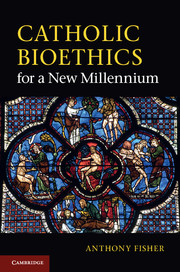Book contents
- Frontmatter
- Contents
- Foreword
- Abbreviations
- Introduction
- PART I How are we to do bioethics?
- Chapter 1 Context: challenges and resources of a new millennium
- Chapter 2 Conscience: the crisis of authority
- Chapter 3 Cooperation: should we ever collaborate with wrongdoing?
- PART II Beginning of life
- PART III Later life
- PART IV Protecting life
- Index
- References
Chapter 2 - Conscience: the crisis of authority
from PART I - How are we to do bioethics?
Published online by Cambridge University Press: 05 June 2012
- Frontmatter
- Contents
- Foreword
- Abbreviations
- Introduction
- PART I How are we to do bioethics?
- Chapter 1 Context: challenges and resources of a new millennium
- Chapter 2 Conscience: the crisis of authority
- Chapter 3 Cooperation: should we ever collaborate with wrongdoing?
- PART II Beginning of life
- PART III Later life
- PART IV Protecting life
- Index
- References
Summary
Some wrong turns
I keep a lady in my car. From the dashboard she instructs me on which way I should go in life. ‘In three kilometres turn left’, she commands. ‘Turn around’, she pleads. ‘Coming up, on your right, you have arrived’, she advises. She is, of course, a global positioning satellite navigator and I would be lost without her calm voice telling me where to go. She can be wrong at times, because of mechanical faults or wrong information, especially about new developments on the roads. Sometimes I ignore her or switch her off. Usually I obey her, and I have found that when I fail to do so, through inattention or a belief that I know better, I am usually sorry later.
Conscience is sometimes thought of as our inbuilt satellite navigator, though I argue in this chapter that in important respects conscience is not like that. Many people talk as if conscience were a sort of angelic voice distinct from our own reasoning that comes, as it were, from outside us, even if we hear it inside our head or heart. On this view it is generally trustworthy, but we must decide whether to obey it, nonetheless. Cardinal Newman, whose life and work has been described by Pope Benedict XVI as ‘one great commentary on the question of conscience,’might have encouraged such a view when he called conscience a messenger of God, ‘the aboriginal Vicar of Christ’. Newman’s influence at Vatican II is evident in the citation of this text in the Catechism of the Council and in the Council’s poetic description of conscience as a ‘voice’ of God, echoing in the depths of the person.
In the depths of his conscience, man detects a law which he does not impose upon himself, but which holds him to obedience. Always summoning him to love good and avoid evil, the voice of conscience when necessary speaks to his heart: do this, shun that. For man has in his heart a law written by God; to obey it is his very dignity; according to it he will be judged. Conscience is the most secret core and sanctuary of a man. There he is alone with God, whose voice echoes in his depths. (GS 16; cf. VS 54; CCC 1778)
- Type
- Chapter
- Information
- Catholic Bioethics for a New Millennium , pp. 38 - 68Publisher: Cambridge University PressPrint publication year: 2011



